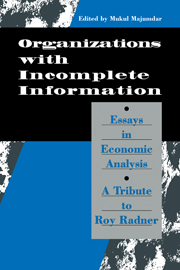Book contents
- Frontmatter
- Contents
- List of Contributors
- Preface
- Introduction: Searching for Paradigms
- 1 Equilibrium with Incomplete Markets in a Sequence Economy
- 2 The Existence of Rational Expectations Equilibrium: A Retrospective
- 3 Rational Expectations and Rational Learning
- 4 Dynamic Games in Organization Theory
- 5 The Equilibrium Existence Problem in General Markovian Games
- 6 A Practical Person's Guide to Mechanism Selection: Some Lessons from Experimental Economics
- 7 Organizations with an Endogenous Number of Information Processing Agents
- 8 A Modular Network Model of Bounded Rationality
- Index
7 - Organizations with an Endogenous Number of Information Processing Agents
Published online by Cambridge University Press: 09 October 2009
- Frontmatter
- Contents
- List of Contributors
- Preface
- Introduction: Searching for Paradigms
- 1 Equilibrium with Incomplete Markets in a Sequence Economy
- 2 The Existence of Rational Expectations Equilibrium: A Retrospective
- 3 Rational Expectations and Rational Learning
- 4 Dynamic Games in Organization Theory
- 5 The Equilibrium Existence Problem in General Markovian Games
- 6 A Practical Person's Guide to Mechanism Selection: Some Lessons from Experimental Economics
- 7 Organizations with an Endogenous Number of Information Processing Agents
- 8 A Modular Network Model of Bounded Rationality
- Index
Summary
Introduction
Information Processing Endogenously Many Agents
An organization is a group of people, but not all groups of people are called organizations, nor is the study of every economic interaction classified as the economics of organizations. A defining characteristic of organizations is that the group has some kind of group objective or performance criterion that transcends the objectives of the individuals within the group. We can thus talk about the design of organizations in pursuit of this objective. Sometimes the performance criterion is as weak as Pareto optimality; the design of economic systems can be thought of as the design of organizations on a large scale. More frequently, the performance criterion is a very specific and complete ordering, such as the maximization of a firm's profits.
Models of bounded rationality – defined broadly to mean any models of agent behavior that depart from the paradigm of effortless full rationality – have been appearing in most fields of economics in the last decade. This is because the fields have matured enough that some important open questions require more accurate models of human decision making than full rationality. In contrast, bounded rationality has always been an important theme in the economics of organizations. This is because the sharing of information and of information processing tasks is such an important part of the interaction between members of organizations and because most large organizations contain many agents whose sole duties are to process information.
More recent innovations in the literature on bounded rationality in organizations have been the explicit modeling of the computation constraints of individual agents and the endogenous determination of the number of information processing agents.
- Type
- Chapter
- Information
- Organization with Incomplete InformationEssays in Economic Analysis: A Tribute to Roy Radner, pp. 239 - 305Publisher: Cambridge University PressPrint publication year: 1998
- 18
- Cited by



